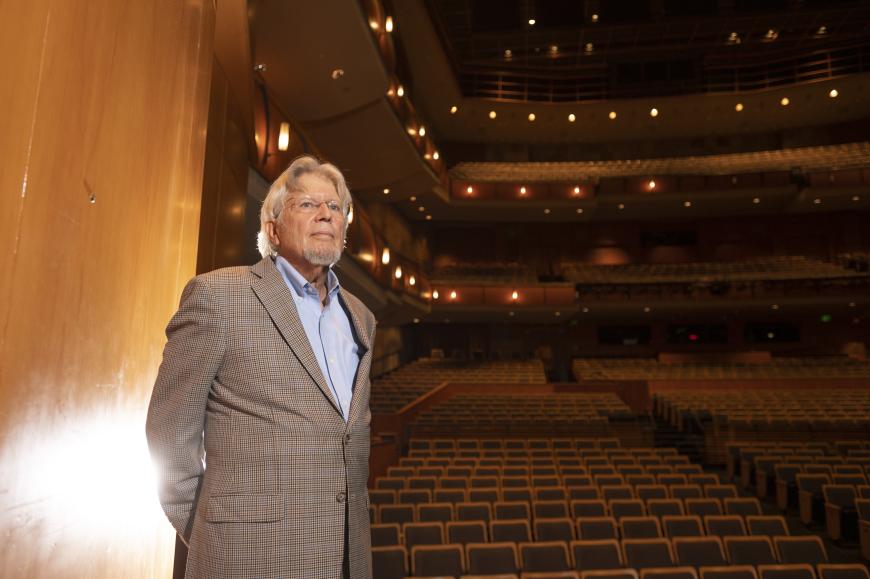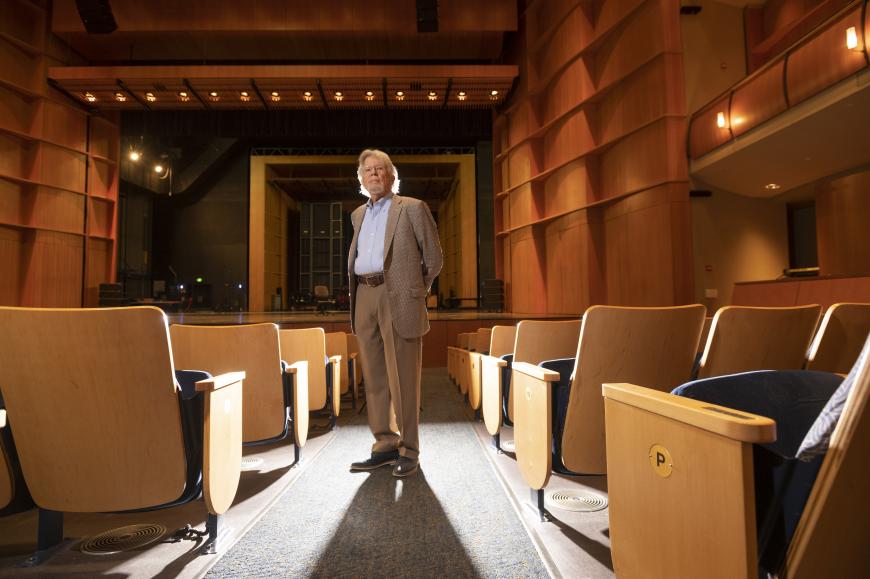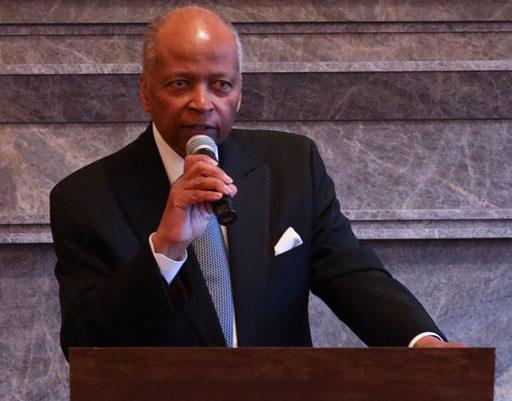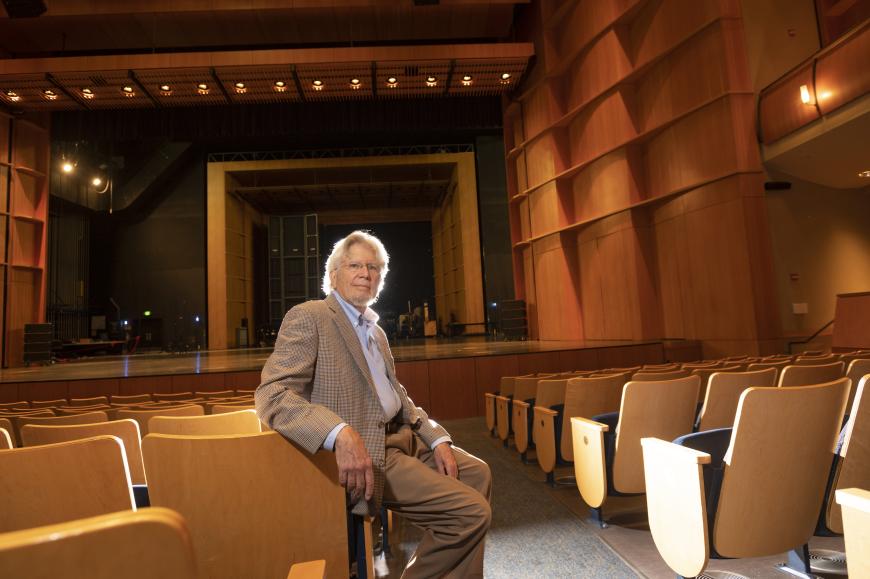
Don Roth, the Mondavi Center for the Arts’ longtime executive director who brought top artists like Yo-Yo Ma and Pink Martini to UC Davis, announced earlier this year his plans to retire once the current season ends. His tenure at Mondavi, which is currently celebrating its 20th anniversary, spanned 17 of those seasons.
Roth plans to continue to reside in Davis, a college town that he played a significant role in transforming into a cultural hub, both in his role at the Mondavi Center and as co-chair of former Sacramento Mayor Kevin Johnson’s regional arts initiative, For Arts’ Sake. He will continue in his role as a board member of San Francisco Classical Voice, which he led through its expansion into the Los Angeles region and guided its strategy.
“Things are in good shape artistically, audiences have come back, and we’re in good shape financially, so it just felt like a good time,” Roth, 78, said in an April phone interview. Besides, he added, “we have a great staff to carry the work on with a shared sense of values.”
Roth’s proudest accomplishments include the establishment of the Mondavi Center’s $1.5 million Artistic Ventures Fund a decade ago, which has allowed it to take artistic chances, gamble on expensive productions like Ballet Preljocaj’s Swan Lake, and close financial gaps when necessary. He’s also proud of bringing diverse — and always excellent, he adds— programming to Davis, as well as his work in making the arts more accessible, particularly for UC Davis’s student population.
The Mondavi Center in January announced that it was conducting a nationwide search for a new executive director. As of May, it has not yet announced Roth’s successor.

From Library Worker to Top Orchestra Leader
Many who end up working in arts management discover their passion for classical music as young children, usually through their music enthusiast parents. Such was not the case for Roth, who was raised in Brooklyn by his letter carrier father and secretary mother and never learned to play any musical instrument. Instead, he got his introduction to classical music in high school through his classical music-obsessed friend group.
“There was a point at which they decided this guy is going to be really boring unless we get him into it,” Roth said. His friends made it their personal mission to get him interested in classical music, and it worked; he remembers watching in amazement as an older friend conducted The Marriage of Figaro at Brooklyn College.
Another core memory included witnessing Leonard Bernstein conduct Mahler’s Symphony No. 3. He and his friends had bought heavily discounted youth tickets — around $1 each, he recalled — and all they could see were the cellos. Still, the experience was “overpowering” and made him realize the power of music.

Roth considers Bernstein to be one of his main inspirations. “Bernstein really felt like there didn’t need to be a barrier between classical music and the audience, that they didn’t need to feel that they had to be highly educated in it, that it was powerful enough to be direct, and that’s always influenced me,” Roth said. “I’ve tried throughout my career to make things as accessible as possible, because the arts should not be the province of the rich or the province of people who have PhDs. They should be the province of anybody who could benefit from having such wonderful music in their life.”
At UC Davis, he developed and taught an undergraduate seminar meant to introduce students to a wide range of art experiences. Much of the course encourages students to “trust their judgment” when attending a concert that’s new or different to you — whether that’s modern dance or jazz or classical music.
Roth’s career took fascinating turns before making it into the field of arts management. His first job, at 14, was to knock on people’s doors and ask them to return their library books. (Most people were either friendly or not home, but he’d stumble upon the occasional angry book borrower, he recalled). Roth studied American history at Brown and Yale before pursuing a doctorate in African American history at the University of Texas. He had a stint in politics, working as chief of staff for John Trevino Jr., Austin’s first Mexican American councilmember. Roth also served as a classical music announcer for KMFA, Austin’s classical music radio station.
It was his time as Trevino’s chief of staff that taught him key tenets of leadership and laid the groundwork for his future career in arts management.
“We were constantly being lobbied by the people who ran the museum and the people who ran the symphony and people who ran the theaters and I thought, ‘Well, I like the arts a great deal, particularly classical music,’” Roth said. “I thought I’d much rather work with music than with zoning.”
When he heard about an opening at the Austin Symphony for general manager, he pitched himself for the job, despite having no prior experience in the field. A month later, he had it. “They took a chance on me, and it really worked,” he said. Later, he’d go on to hold leadership positions at several other notable organizations: the San Francisco Symphony, Oregon Symphony, St. Louis Symphony, Aspen Music Festival and School, and Hartford Symphony.
Longtime industry colleague Wayne Brown, president and CEO of the Detroit Opera, said he takes great delight in hearing of Roth’s retirement news. (Brown recently announced that he, too, would be stepping down from his post at the conclusion of the 2023-2024 season after 50 years of working in the arts business.)

The pair had met early on in their careers, when Roth was Hartford Symphony’s orchestra manager and Brown the Springfield Orchestra Association’s orchestra manager. From time to time, they would meet near the Connecticut-Massachusetts border to discuss challenges, opportunities, and projects, according to Brown. Later on, Brown said, Roth brought together a group of five arts professionals who each share an interest in the arts — and also culinary and wine pairings. “Don is a great collaborator,” Brown wrote in an email, and each group member provides “distinct perspectives that continue to be shared and celebrated … equivalent to a string quintet!”
“Retirement can mean many things … not necessarily no longer maintaining professional ties,” Brown wrote. “As one of the most respected Arts Leaders in the industry, Don is not short of possible options.”
Guiding Mondavi Through Unprecedented Times
To this day, the lessons Roth learned from his time working closely with Trevino guide his philosophy. Trevino refused to let others rush him into making rash decisions, preferring to wait for more evidence before making a choice — even when waiting was unpopular, Roth said.
“A lot of urgency is false urgency, it’s people wanting a decision to be made quickly because that would be great for them,” Roth said. “But it isn’t necessarily driven by those situations and John [Trevino] was just such a good leader. He was very kind and empathetic to people, but he was also very direct.”
As other arts organizations poured resources into producing virtual concert experiences at the start of the pandemic, Roth held back. “It was a situation where it was important to step back from all of the horror of the moment … and try and get ourselves through in a way that was true to who we were at the Mondavi Center,” he recalled.

For them, that meant honing the Center’s strength as a live performance venue and not competing to be a big player in the virtual space. (Mondavi did hold a few virtual events, mostly with the artists who would have performed during the 2020-2021 season that was canceled.)
“You have to have a clear set of values,” Roth said “Nonprofits go off the rails when they lose focus, when they react and they keep reacting to this thing and then they move over here. And they react to that thing.” It was yet another leadership lesson he’d learned from Trevino.
One of the final programs that will be performed under Roth’s leadership is a performance by Curtis Symphony Orchestra, on Monday, May 22, that includes Da Wei’s Awakening Lion; Bela Bartok’s Piano Concerto No. 2 in G Major, with Yefim Bronfman as soloist; and Nikolai Rimsky-Korsakov’s Scheherazade. The performance will be dedicated to Roth.
For years, Roth said, he has attended around eight nights of concerts per 10 days. He has no complaints about his “fantastic” job, but he’s looking forward to being able to sit back and finally enjoy Mondavi concerts as a proper audience member.



